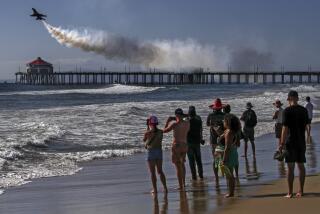Expansion of San Diego waterfront convention center approved
SAN DIEGO — The California Coastal Commission voted unanimously Thursday to approve an expansion of the waterfront convention center here — an issue that pitted the needs of the Comic-Con convention against those of the Chargers football team.
Comic-Con leaders said the expansion is vital to keep the summer pop-culture extravaganza from having to leave San Diego in search of a larger venue.
But the Chargers had opposed the expansion, putting forth an alternative plan for a joint stadium-convention center expansion several blocks from the current center. For a decade, the team has warned that economic pressures could force it to leave San Diego unless it gets a stadium to replace aging Qualcomm Stadium.
“The result is no surprise, given the influence of the powerful groups supporting the project,” said Chargers spokesman Mark Fabiani. “Still, it was disappointing to see the Coastal Commission ignore its own staff’s recommendation.”
The $520-million expansion is meant to provide an additional 740,000 square feet of convention space to help retain Comic-Con and also attract other large conventions — particularly from the medical profession — that now skip San Diego in favor of cities with larger convention centers, including Los Angeles and Anaheim.
The Coastal Commission staff recommended that the proposal be rejected, saying that it would block “one of the few windows to the water along a heavily built-up boulevard” and push development unacceptably close to the bay.
But commission members, while expressing concern about loss of a view corridor, approved the project.
Commissioner Mark Vargas praised the waterfront location. “I’m jealous,” he said. “I’m from Los Angeles.”
Commissioner Robert Garcia said he has attended 17 Comic-Con gatherings. Commissioner Mary Shallenberger said, apparently in jest, that she attended one Comic-Con convention and found the costumes “frightening.”
Before the vote, David Glanzer, spokesman for Comic-Con, said that although the event has been held in San Diego since it began in 1970, its future is in doubt as the pop-culture festival continues to grow. Its contract to use the center runs through 2016.
“We’ve outgrown the current convention center,” he said. “We struggle to stay here.”
The campaign to win commission approval involved business and labor groups, elected officials and appointed members of the Port District and Convention Center governing boards. More than 2,000 letters and emails were sent to the commission in favor of the project.
A parade of speakers recited numbers: The convention center expansion would create 7,000 permanent jobs and 3,000 construction jobs and bring $700 million a year to the economy and $13.5 million in additional tax revenue from new conventions.
“We have a chance today to create real economic opportunity for thousands of San Diego families,” said Councilman Kevin Faulconer, a candidate for mayor.
The commission vote cannot be appealed, but the funding strategy for the expansion is being challenged in court. A large part of the $520-million cost would come from a surcharge on rooms agreed to by hoteliers — an arrangement that is being challenged as an unlawful privatizing of the city’s taxing authority.
“Now attention will turn to an appeals court ruling on the legally dubious tax that was invented to pay for all of this,” Fabiani said.
But key supporters of the expansion plan vowed to help the Chargers develop a stadium project for taxpayers’ approval. Acting Mayor Todd Gloria promised to immediately begin working to fashion such a project, preferably on the eastern edge of downtown near the Chargers’ preferred site.
“We are a world-class city and world-class cities have professional football,” Gloria said. “My goal is to keep the Chargers here.”
Christopher Neils, a prominent real estate attorney and board member of the San Diego Chamber of Commerce, said the chamber supports a stadium project “but not at the expense of this convention center proposal.”
Proponents greatly outnumbered opponents at the commission meeting, held in a local hotel, but some veteran environmental activists joined with the commission staff.
Land-use attorney Cory Briggs disputed the contention of officials at the Port District and City Hall that the expansion needed to be connected to the existing center. The Chargers’ plan suggested an expansion that would not have been contiguous.
Briggs presented documents indicating that when the convention center was last expanded, Port District officials appeared to agree that further expansion would have to be across the street from the waterfront center.
Don Wood, former president of Citizens Coordinate for Century 3, a local planning group, said the expansion will continue a process of walling off the waterfront with high-rise hotels and other development.
But Commissioner Greg Cox, a member of the San Diego County Board of Supervisors, said that though concerns about blocked views are legitimate, the goal of a waterfront with open vistas is “a ship that left a long time ago.”
More to Read
Sign up for Essential California
The most important California stories and recommendations in your inbox every morning.
You may occasionally receive promotional content from the Los Angeles Times.










